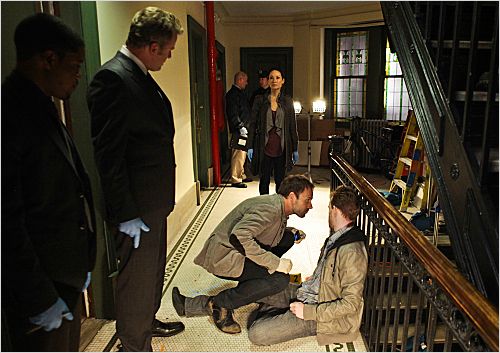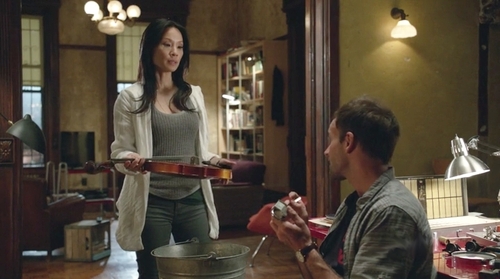
Courtesy of CBS
Elementary returns for its second episode, establishing how the rest of the season is likely going to go. But does it follow through with the potential it showed in the pilot?
Let’s bitch it out…
Upon viewing the second episode of the season, a very apparent formula is taking shape, and I can’t say that I’m excited about it. I see it as follows:
- Holmes (Jonny Lee Miller) and by default, Watson (Lucy Liu) are asked to consult on a homicide case by Captain Gregson (Aidan Quinn). When Holmes and Watson arrive, they find Gregson’s “best guys” (apparently) scratching their heads wondering how on Earth they’re going solve the murder, having no idea how to do their jobs.
- Holmes butts heads with the resident hotshot detective on the team, in this case it’s Detective Bell (Jon Michael Hill). Bell meets Holmes’ unorthodox methods of deduction with intense skepticism. (Side Note: It looks as if Hill will continue to be the “detective who’s threatened by Holmes” based on his inclusion in the spiffy new opening credits. Here’s hoping Bell will eventually develop a relationship with Holmes which will negate this whole antagonistic song and dance altogether…)
- Holmes essentially solves the crimes in a matter of minutes by looking at very obvious clues that the swarming team of the city’s finest are oblivious to. Even with Holmes’ airtight scenarios, the close-minded cops refuse to listen to him and end up going after the wrong suspect.
- Holmes and Watson then take it upon themselves to go looking for the killer without any police aid, which, for some unexplainable reason, is always sanctioned by the Captain Gregson. (Or he just turns a blind eye because – Hey! It means he doesn’t have to work…)
- We meet the killer, but the clues don’t immediately allow Holmes to see this.
- A decoy killer/suspect is introduced, gets arrested allowing the case to appear to be closed. Since Holmes doesn’t solve the case, this individual is, of course, just a red herring.
- Watson reaches out to Holmes to “get to know him better”, which results in him pushing her further away
- Watson gives Holmes “the silent treatment” and a deus ex machina is placed in Holmes’ path, which allows him to figure out how to entrap the real killer.
- Holmes half-heartedly apologizes to Watson while she tries to ignore him/ice him out. She eventually forgives him when he reveals how to catch the killer to her off-screen.
- The police are (finally)brought in again to set-up an elaborate scheme that allows the real killer to be caught.
- Holmes delivers a speech either to the killer, or to someone in earshot, (which is just a explanatory monologue to help out those audience members who haven’t quite pieced things together). In the speecifying, Holmes outlines exactly how the killer did the deed and how he/she figured they would get away with it.
- Watson and Holmes share a heart-to-heart that reveals a mere breadcrumb about their character histories.
Of course, since we’re only on the second episode of the season, there’s bound to be a bit of wiggle room with these steps, but already, the series is falling into a predictable path. What I enjoyed most about the pilot was the chemistry between Miller and Liu, but if left to confines of this formula, I doubt it will reach its full potential.
Yes, Holmes’ methods are unorthodox and a wee bit crazy, but he’s proven himself to be right more times than not. This makes it absolutely tedious when everyone (including Watson) questions him and drags out the resolution so that it fits nicely into a 40 minute, three-act structure.
No doubt there’s bound to be interesting moments along the way, but I can see myself getting mighty tired of going through these motions. I’d much rather see what happens when Watson, Holmes, Gregson and Hill are working together, splitting up in to different teams to figure things out. I acknowledge that Holmes isn’t always right (in this episode he is wrong about the identical twins who turn out to be fraternal) but it would nice to see one of those errors be of actual significance. Wouldn’t it be nice if someone else comes up with a far out deduction that pushes Holmes on the right path? I know I’m trying to force the show into something it’s not – Holmes is the star, so it makes sense that he’s the primary driver – but I just find it frustrating how the supporting characters aren’t doing anything but following him around, or chasing dead leads. It would be much more interesting if they worked together. We get a taste of it in the hospital room fake-out this week (when Holmes deliberately made a scene with Watson and Hill “is in on it” to set up the killer). For me, this is a case of too little, too late (and too obvious).
Ultimately it feels like Holmes has an epiphany in the beginning and right before episode’s end to tie it all together. Everyone else just seems to be throwing unnecessary obstacles in his way (Watson), pigheadedly dismissing him (Hill) or sitting back and letting Holmes do all the work (Gregson). Procedurals need not be predictable; I’ve seen plenty of instances where I have absolutely no idea where things are going to go, but we still end up with a nice, tidy conclusion at episode’s end. I can cite the case-of-the-weeks that we saw on Awake last season, or the monster-of-the-weeks on Fringe as good examples of procedurals that still inject innovation and interest.
The biggest problem I have with the show is this: it’s not taking any risks. As I’ve said, it’s only episode two, so I haven’t jumped ship yet, but something’s got to change in order for me to be continually invested in Elementary.

Courtesy of CBS
Other observations:
- I don’t want to downplay how difficult it must be to find resolution after only 40 minutes. In the last two episodes, I think the show has been great at its checks and balances – not leaving any loose threads around. But traditional episodic television just doesn’t work in this day and age. The show needs to inject more creativity in how it ties up those threads so it’s not so paint-by-numbers. Perhaps then we can get somewhere.
- The violin is introduced – a staple in Sherlock Holmes’ character. I made a similar comment last week: if it weren’t for this little nugget in this episode, the entire thing could have played out with different character names and I would never had guessed it was in any way related to the Sherlock Holmes world.
- The opening credits are quite impressive. I loved how it captured the non-synchronous way that Holmes likely processes his deductions. With so few shows even having an opening credit sequence, it was nice to get one with actual thought and symmetry to the show it is introducing.
- I absolutely adored Miller’s performance during the second AA meeting in which he played the World’s Smallest Violin. So incredibly bizarre and delightfully inappropriate considering the heartfelt confession of the AA member. It was priceless. More moments like these please!
- I miss the compelling visual style we saw in last week’s pilot. Save a couple of weird camera angles sprinkled through the episode, there is no distinctive visual style in this week’s offering. Let’s hope we can revisit the visual aesthetics seen in the pilot going forward.
What did you think viewers? Are you enjoying the show? Anyone giving up on it? Do you think we’ll soon get the introduction of iconic Holmes’ characters like Irene Adler (maybe she was the cause of Holmes’ tears?), or infamous arch-nemesis Professor Moriarty? Hit up the comments section and let us know what you think.
Elementary returns October 18, at 10pm EST on CBS.
I think Holmes has an amazing apartment for being in the supposedly bad part of town